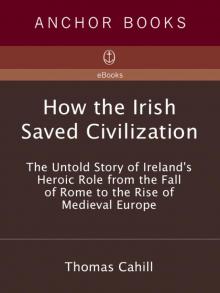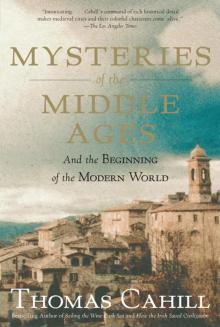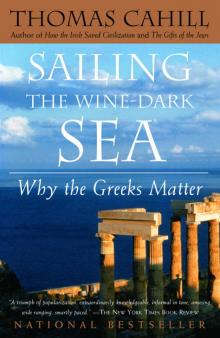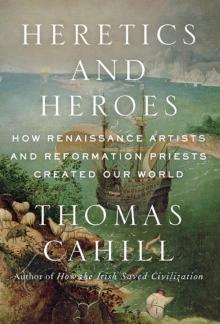- Home
- Thomas Cahill
Heretics and Heroes Page 17
Heretics and Heroes Read online
Page 17
Now we know that the law [of the Jews, especially the Ten Commandments] is spiritual, whereas I am of flesh, sold in bondage to sin. I do not understand what I do. For I do not do what I want to; and what I detest, that I do. Yet if I do what I do not want, I agree that the law is good. But as it is, it is no longer I who do it, but sin that dwells in me. I know that no good dwells in me, that is, in my flesh. I can desire what is good, but I cannot carry it out. For I do not do the good I desire, but instead the evil I do not desire. Yet if I do what I do not want, it is no longer I who do it, but sin that dwells in me. So I discover this principle at work: when I want to do right, evil is ready at hand. For in my inmost self I delight in God’s law; but I see another law in my members battling against the law that my mind acknowledges and making me captive to the law of sin that is in my members. Wretch that I am, who will rescue me from this doomed body? Thanks be to God—(it is done) through Jesus Christ our Lord! So then I myself in my mind am a slave to God’s law, but in my flesh to the law of sin (Romans 7:14–25).
However much such passages may have clicked with Luther, assuring him that Paul had foreseen his dilemma and had the perfect resolution, I doubt Paul was imagining anyone remotely similar to a fussily scrupulous monk. “The law of sin that is in my members”—Paul repeats “my members” at least five times—would have been far more appropriately applied to a Roman paterfamilias, the kind of male who saw himself as free to do whatever he liked to almost anyone, someone closer in presumptuousness to, say, an Arab tyrant, an American movie star, a macho Italian prime minister, or a sensual Frenchman in charge of the IMF.
Nevertheless, Luther fashions the argument of Paul’s letter into the foundation of his own theological vision: “We realize that all things work together for the good of those who love God, for those who are called according to his purpose. Those whom he foreknew, he also predestined to be conformed to the image of his Son [Jesus] that he might be the firstborn among many brothers.8 Those whom he predestined, he also called; those whom he called, he also justified; and those whom he justified, he also glorified” (8:28–30).
By the time Paul wrote these words to the Roman community, probably in the late 50s of the first century AD, there are unlikely to have been many Jewish Christians among them, even though Jews would have been the original founders of the Christian Church in Rome. We know that in the 40s the emperor Claudius had expelled the Jews from the city and that they had only recently been returning in significant numbers. Paul, however, finds it necessary to make reference to his own people in his usual lamenting way: “My sorrow is great and the anguish in my heart is unrelenting. For I could even wish to be accursed and cut off from Christ for the sake of my brothers, my kinsmen by descent. They are Israelites, and to them belong the sonship, the glory, the covenant, the giving of the law, the cult, and the promises; to them belong the patriarchs, and from them by natural descent comes the Messiah, who is God over all, blest forever! Amen” (9:2–5).9
But the Jews have in the main rejected Jesus. This, too, Paul speculates, is part of God’s plan, so as to make room for the Gentiles “until the full number … comes in,” after which “all Israel shall be saved” (11:25–26). This hope, thrown in between more richly rhetorical passages, is not given much logical ballast; it is merely asserted. What occupies Paul more generally is the persistent restatement of his central theme: “If you profess with your lips that ‘Jesus is Lord,’ and believe in your heart that God has raised him from the dead, you will be saved. Such faith of the heart leads to uprightness; such profession of the lips to salvation. For Scripture says, ‘No one who believes in him shall be put to shame.’ No distinction is made between Jew and Greek: the same Lord is Lord of all, bestowing his riches on all who call upon him. ‘For everyone who calls upon the name of the Lord shall be saved’ ” (10:9–13).10
There are certainly passages in the Scriptures that would take us in another direction altogether. Paul and Luther have, in effect, bracketed the whole of the Hebrew Bible, labeled by Christians “the Old Testament.” Yes, in their view that library of witness is—in some sense—the Word of God, but now (since the sacrifice of Jesus) its words can be properly interpreted only in the light of the words of the New Testament.
But just a minute! Cannot even some of Jesus’s words, as recorded by the evangelists, the writers of the four gospels, be set at variance with Paul’s argument? Is not the Good Samaritan—in Luke’s Gospel Jesus’s great (if fictional) figure of authentic kindness—a Samaritan, that is, a despised heretic and no believer in Jesus? Is he not meant to be seen as saved by his acts of kindness to the anonymous victim of a mugging, whom more respectable types refuse to assist?
And, even more pointedly, what of all those who at the Last Judgment in Matthew’s Gospel are welcomed into Heaven not because of their faith, but because of their deeds? Do they not even confess to Christ that they were unaware of his presence in their lives? Could they not be unbelieving Jews or Hindus or (my God!) atheists?
When the Son of man [Jesus] shall come in his glory [at the end of time], and all the holy angels with him, then shall he sit upon the throne of his glory. And before him shall be gathered all nations; and he shall separate them one from another, as a shepherd divideth his sheep from the goats. And he shall set the sheep on his right hand, but the goats on his left. Then shall the King [Jesus] say unto them on his right hand, “Come, ye blessed of my Father, inherit the kingdom prepared for you from the foundation of the world. For I was an hungred, and ye gave me meat, I was thirsty, and ye gave me drink, I was a stranger and ye took me in, naked and ye clothed me, I was sick and ye visited me, I was in prison and ye came unto me.” Then shall the righteous answer him, saying, “Lord, when saw we thee an hungred, and fed thee? Or thirsty, and gave thee drink? When saw we thee a stranger, and took thee in? Or naked, and clothed thee? Or when saw we thee sick, or in prison, and came unto thee?” And the King shall answer and say unto them, “Verily I say unto you, inasmuch as ye have done it unto one of the least of these my brothers, ye have done it unto me” (Matthew 25:31–40).
What I mean to point out by citing critical biblical passages that seem to argue against the Pauline/Lutheran stance of justification by faith alone is that the Bible is indeed a complicated business, not in any sense a single book dropped by God into the laps of the faithful for their simple instruction and edification, but an elaborate double library of many separate volumes (most in Hebrew with a little Aramaic mixed in and containing a separate bookcase or two in Greek), the oldest stories originating in a dimly appreciated, preliterate Mesopotamian society, the whole production the result of more than a thousand years (perhaps, if we go back to earliest sources, more than two thousand years) of storytelling, transmission, addition, and revision, written, rewritten, edited, and compiled by more hands and hearts—and in more places and evolving cultures—than we will ever be able to identify; and all this adding to the unadulterated mystery even of the most recent volumes, dating to about the end of the first century AD.11
Here, in the second decade of the sixteenth century, as Luther lectures to his university students on the text of Romans, we are looking at an early moment in something almost analogous to the Big Bang. Thanks to the scholarship and entrepreneurial labors of Erasmus, the original Greek text of the New Testament is on the verge of becoming widely available once more. It will, together with a growing continent-wide hunger for pristine literary texts of all kinds and—most unexpectedly—the spark of Luther’s immensely subjective reading of the Bible, induce a societal explosion of, well, biblical proportions.
Luther’s personal approach to the Bible could scarcely have been further from the careful, text-reverencing approach of Erasmus, whose notes to his edition of the New Testament are marvels of dispassionate consideration of style and content, still useful (and even revelatory) to a contemporary biblical scholar. In Luther’s exposition the contemporary scholar will find only Luther, not especially interested in history
or the evolution of cultures and ideas, in search of the Word of God only to quiet the quaking in his breast.
At the same time, we should not imagine that Luther’s psychological theology came to him full blown. Though it is easy enough now to read his earliest notes on Romans and see where he is headed, it would take the prompting of an unusually shameless and aggressive display of ecclesiastical corruption to provoke Luther into the public challenge that would make his a household name throughout Germany and, soon thereafter, throughout Europe. That irruption would ever after be called the Indulgences Controversy.
Albrecht of Brandenburg was a bishop in need of money, lots of it and as soon as possible. He was a pluralist, which may sound like a good thing but wasn’t. In recent times, the word is sometimes drafted to mean a philosopher holding more than one ultimate principle; in Luther’s time it meant only someone holding more than one bishopric.l2 Albrecht held two and a half: in 1512 he was named archbishop of Magdeburg and administrator of the monastic town of Halberstadt and from 1513 he was also archbishop of the much grander city of Mainz. The archbishop of Mainz was one of the seven electors of the Holy Roman Emperor and therefore one of the most powerful men in Germany. Albrecht could not at first exercise his episcopal offices because he was still in his early twenties, and the church’s canon law required an acting bishop to be at least thirty. Pope Leo X, himself only thirty-seven at his election (having been created cardinal at the tender age of thirteen, though not ordained priest till after his election), found that he and Albrecht had so much in common that he graciously dispensed with the canon that blocked Albrecht’s path. What the pope and the archbishop especially had in common was their need for vast sums of money, Albrecht because he was in serious debt to the Augsburg banking house of the Fugger family, Leo because he was extraordinarily overextended. He loved the many beautiful and expensive purchases that he made continually and unhesitatingly; he had wars to conduct; he was, in addition to his duties as pope, ruler in all but name of his beloved Florence (and the second legitimate son of Lorenzo il Magnifico); and he was building the new Saint Peter’s Basilica, for Heaven’s sake.
Why, you may ask, would anyone want to be archbishop of two separate sees more than 250 miles apart? Awfully burdensome, no? No, since one of the few distinct obligations would be to collect the revenues due by law to the archbishop of each city. It was in anticipation of such income that the famous Fuggers had extended their loans in the first place.
Pope Leo meant to raise the new Saint Peter’s without making any contribution from his own purse, which he reserved for more personal satisfactions. To pull this off, the obvious papal route would be a spectacular secret deal. Leo was good at doing deals: after all, important bishoprics (and not a few unimportant ones) were always for sale. This was how Albrecht, the baby bishop, had won Mainz: the Fuggers had put up the capital that Albrecht had turned over to the pope in exchange for his appointment. Such quid pro quo, called simony,13 was the oil that lubricated the greasy world of ecclesiastical appointments.
To lubricate all necessary wheels, Albrecht entered into an agreement with the pope and the Fuggers: the bankers would finance the continued building of Saint Peter’s; Leo would renew the practice, initiated by his predecessor Julius, of selling indulgences to fund the building of the papal basilica; Albrecht would allow a band of salesmen to enter his dioceses to sell the indulgences to the faithful; and the proceeds would be split fifty-fifty between the pope and the Fugger family.
We who in the recent past have been victimized by a great conspiracy of bankers may be tempted to regard the Fuggers as the underlying villains in this deal. But the astonishing self-regard and almost cosmic gluttony of the reverend churchmen—neither of whom had so much as a dash of genuine spirituality in his makeup—can hardly be minimized. Both supposed “successors to the apostles” were worldly epicureans, devoted to their own pleasures. Albrecht was a Hohenzollern, amorous and overweight. His influential family, from whom would spring the kings of Prussia, was using his appointments to block the ambitions of a rival clan, led by Frederick the Wise, also an imperial elector. Saxony was divided between the two families. Leo’s family, the Medici, iconic bankers of Europe, would in this period lose their precedence to the fabulous Fuggers. Leo himself, dying unexpectedly of malaria in late 1521, would leave empty the papal treasury, which had been overflowing at the time of his election, and leave his successors struggling under considerable debt.
To understand what an indulgence is, one must visit the funhouse of medieval theology. The first Christians seem to have expected the end of the world (and the Second Coming of Christ in judgment) to occur in their own lifetimes or soon thereafter. As the interim between the two advents of Christ began to stretch into centuries, prophets would rise in most eras to announce that the End Time was just around the corner. Then, after nothing happened, the prophets would fall and be forgotten. Most Christians turned their attention from the possible end of the world and toward the mystery of death. If Christ is unlikely to return in my lifetime, what can I expect after death? What can my friends and family expect? What can I do for those who have gone before me, those who “sleep in Jesus,” as Paul put it in his letter to the Thessalonians?
I can pray for them, of course. More than that, because the church is a Communion of Saints, of those on earth and of those who have gone before, I can surely pray—that is, speak in supplication—to those who have already reached God and ask them to pray for me and for others who may need their prayers. But what can I do for a loved one—a friend, a parent, a spouse, a child—who I know made a mess of things on this earth, who stole money, betrayed another, committed murder, told monstrous lies, or failed to fulfill profound obligations to others? In brief, what can I do for friends, acquaintances, and relations who failed at some point in the course of their earthly existence in their duty to love God and neighbor—which category probably includes most people?
If they failed spectacularly, they are already in Hell and there is nothing that can be done for them. Spectacular failure—in medieval Christian terms—was not a matter of doing great evil (say, genocide or serial murder or robbing widows or oppressing orphans) but of failing to repent for what one had done. Even the most grievous sin could be forgiven if one were to repent sincerely, for God is merciful. Hell was reserved for those who failed to repent, who by clinging to their sin had made themselves permanently unworthy of God’s presence. This was why sudden death was so feared: it did not give you time to put your spiritual house in order. You might have meant to repent but hadn’t quite got round to it. Too bad. Down you go. All the way.
Thanks be to God, the mysterious Communion of Saints that we (or at least all the baptized) are part of has a very earthly component, the visible, audible church, which guides us along the paths of our lives, enabling us to sort out our sins, make repentance, and at the last return to God. In its manuals for priestly confessors, the church enumerates the sins we must all confess, listing these in order of seriousness from the least (venial) to the most serious (mortal), to those so grave as to entail formal excommunication from the Communion of Saints and, therefore, requiring special dispensation, such as a writ of forgiveness issued by a bishop or pope.
One of the big questions in all this is: Who gives forgiveness? The only obvious answer is God or, if you like, God in Christ. On what basis does God, the Supreme Being who created all things and keeps them in existence, forgive? The basis is the blood of Christ, the Incarnate Word who by his suffering and death redeems mankind, who buys back human beings from their just perdition, which their sins should by rights make inevitable. This salvation was first foretold (ever so dimly) by God in the Garden of Eden just before the first man and the first woman were sent off into permanent exile (Genesis 3:15). Then, in the course of the Old Testament it was foretold ever more explicitly, especially in the words of the latter prophets, whose books Christians moved (from their original position after the Torah in the Hebrew Bible) s
o that they would serve as introduction to the four gospels of the New Testament.
But God uses ordinary men for his purposes. One of the clearest uses may be seen in his deployment of the clergy to guide and instruct other Christians, who are mostly ignorant and illiterate. Priests and their bishops are there to lead the rank and file in the fulfillment of their Christian duties, to remind them of their sins, and to guide them to repentance.
Okay, but, keeping in mind how dull-witted most of these people are, let us, the clergy, lead them not just by example and exhortation but by law and order, prescription and proscription, regulation and exclusion, condescension and condemnation. Ordinary Christians must be kept in line for their own good and for the good of society as a whole.
It is easy to see how, as literacy increased by leaps and bounds and as the petty chieftains of Europe gradually grew into powerful princes of grand ambition, the time-honored legitimacy of pastors leading their human flocks and of bishops interfering in the political sphere might be called into question, especially as so many members of the higher clergy were seen not as holy exemplars but as grasping hypocrites, looking to take personal advantage of the whole complicated system they themselves had created.
Erasmus and other humanists had already made “silly little ceremonies” the objects of their derision. No arena of church life was more open to criticism and satire than the scam of indulgences. However sincere the original idea may have been, indulgences seem to have been designed as virtually irresistible temptations for corrupt churchmen. The original idea was that you or I, because we had been saved by the blood of Jesus and were members of the Communion of Saints, could call upon the merits he had piled up for us in the course of our redemption and apply them to ourselves and to others.
Huh?
This is where most reasonable people may begin to lose the thread of ecclesiastical reasoning. The merits of Christ—and of his saints (those already with him in Heaven)—came to be seen by higher churchmen as a sort of bank account of infinite worth that could be called upon as needed. The church—that is, higher churchmen—could set the rules for writing checks against this account. According to these rules, the faithful could borrow from the merits of Christ and assign them to the needy, either to themselves or to others, especially to their deceased loved ones. Thus, the kissing of a certain bone from a dead martyr’s hand, penitential pilgrimage to a particular shrine, an assigned set of prayers, an assigned number of masses (endowed by the pious faithful and whispered by a priest at a designated altar), a good work (such as volunteering at a hospice), even a financial contribution to the building of a small chapel or a great basilica, could shorten or even eliminate the temporal suffering due to sin.

 How the Irish Saved Civilization
How the Irish Saved Civilization The Gifts of the Jews
The Gifts of the Jews A Saint on Death Row
A Saint on Death Row Mysteries of the Middle Ages
Mysteries of the Middle Ages Sailing the Wine-Dark Sea
Sailing the Wine-Dark Sea Heretics and Heroes
Heretics and Heroes Desire of the Everlasting Hills
Desire of the Everlasting Hills